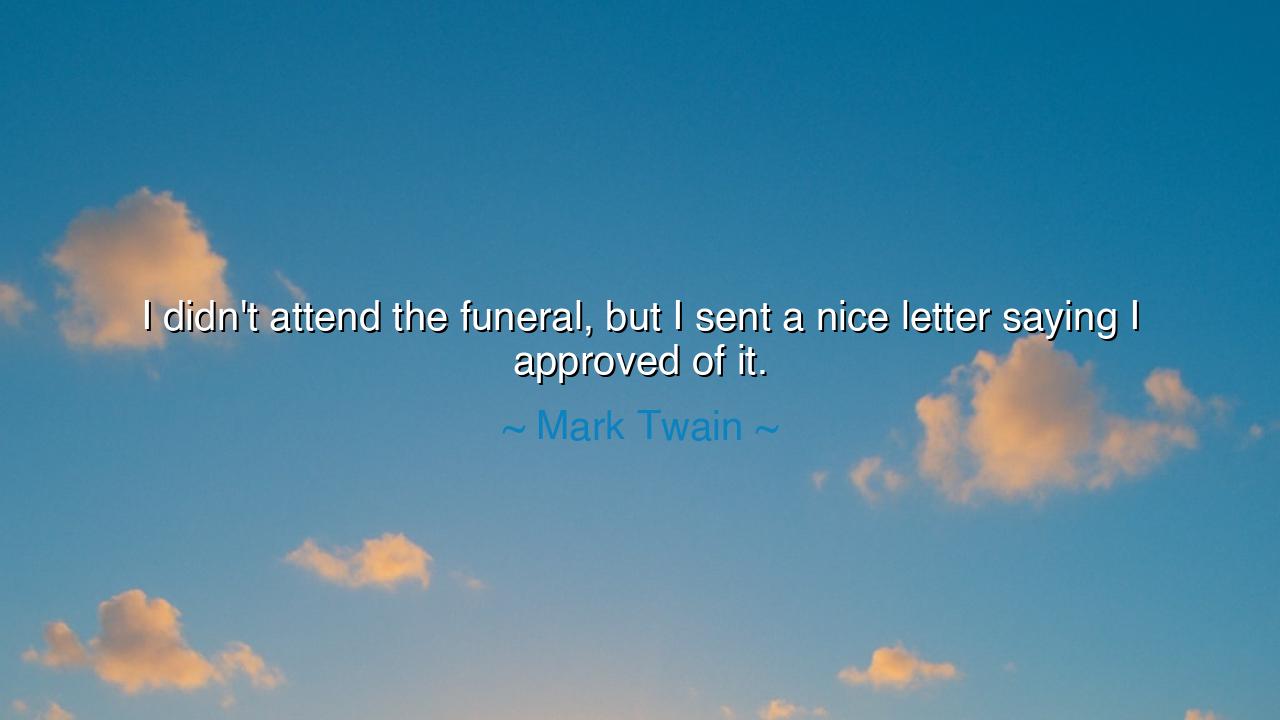
I didn't attend the funeral, but I sent a nice letter saying I






When Mark Twain uttered the wickedly humorous line, “I didn’t attend the funeral, but I sent a nice letter saying I approved of it,” he was not merely jesting—he was revealing one of the sharpest truths about the human heart. Cloaked in laughter, his words carry the sting of honesty and the depth of moral reflection. Twain, the great humorist of the American age, often hid his wisdom behind laughter, for he knew that mankind swallows truth more easily when it comes sweetened with irony. This quote, biting yet brilliant, speaks of revenge, resentment, and the strange satisfaction of moral victory—the moment when the wronged person, instead of striking back, simply outlives the offender and meets their fall with wry amusement.
To understand these words, one must first understand the man who spoke them. Samuel Clemens, known to the world as Mark Twain, lived a life steeped in both humor and heartbreak. Beneath his jokes ran the undercurrent of a man who had seen hypocrisy, cruelty, and folly at close range. He had watched society praise the wicked and punish the innocent, had suffered loss and betrayal, and had learned to survive not with bitterness but with laughter. Thus, when he said he “approved of” the funeral, it was not a literal approval of death, but a figurative triumph of justice—the idea that time itself avenges what the heart cannot.
In his statement lies a mirror to the timeless struggle between vengeance and virtue. Many men, when wronged, burn with the desire to strike back. They carry their anger like a sword, striking wildly until they themselves are consumed. But Twain’s humor transforms vengeance into elegance. He does not act, he observes; he does not rage, he smiles. The “letter” he speaks of is symbolic—it is the quiet satisfaction of a man who no longer needs to fight, for life itself has brought the reckoning. His laughter is not cruelty—it is wisdom. It says: “Do not waste your soul in hate. Wait, and the world will deliver justice in its own way.”
This attitude echoes the wisdom of the ancients. Consider Marcus Aurelius, the philosopher-king, who wrote, “The best revenge is to be unlike him who performed the injury.” In those words, and in Twain’s jest, lies the same teaching: that dignity and patience triumph where fury and retaliation fail. Twain’s humor is the armor of the wise—he turns the pain of insult into laughter, transforming bitterness into art. Where others might curse, he smiles with irony and moves on. His letter of “approval” becomes a symbol of emotional mastery: the victory of composure over chaos.
History too has seen such moments. When Abraham Lincoln was mocked and slandered by his rivals, he bore it with grace. When told of the death of one of his fiercest political enemies, he did not gloat. He said softly, “I forgive him,” and went on with his work. That is the spirit Twain’s humor conceals beneath its sharpness—the power to rise above enmity. The humor, though biting, is never cruel for its own sake; it is the laughter of release, of letting go. It tells us that hatred, carried too long, poisons the vessel that holds it, and that sometimes, the sweetest justice is the quiet peace of moving forward.
But the quote also speaks to another truth—the irony of human pettiness. Twain’s wit exposes the small, vindictive side of man, who, even after death has claimed his foe, cannot help but smirk. It is a confession that we are not saints, and perhaps need not pretend to be. For humor, when used wisely, allows us to acknowledge our flaws without being ruled by them. Twain’s jest invites us to laugh at ourselves—to admit that the heart still craves recognition, still delights in poetic justice, and still finds relief in laughter. The danger lies not in feeling these things, but in letting them master us.
So, my children of reflection, learn from the old humorist’s wisdom: when wronged, do not answer with venom. Do not seek revenge that soils the hands and darkens the soul. Let time and truth do their work, for they are better avengers than wrath. When you see the proud fall or the cruel silenced, you may smile—not in malice, but in peace. And remember this final teaching: humor is the language of the strong. To laugh where others curse, to joke where others rage, is not weakness but mastery. In laughter, you declare that life’s injustices cannot break you. And when the day comes that you too “send your letter of approval,” let it not be one of hatred, but of calm—of the soul that has survived, wiser, lighter, and free.






AAdministratorAdministrator
Welcome, honored guests. Please leave a comment, we will respond soon